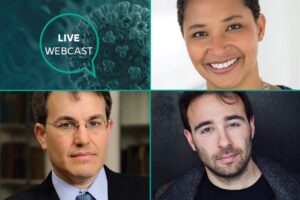
Political scientist Yascha Mounk opened Friday’s conversation about the “deep moral tradeoffs that face us” during the COVID-19 pandemic by asking whether Americans truly have to choose between saving the economy and saving lives.
Danielle Allen, who directs Harvard’s Emond J. Safra Center for Ethics, rejected that very line of thought. Rather than framing it within “conventional cost-benefit analysis,” she said, consider the pandemic a double “existential threat”—to our core institutions and, by consequence, our economy.
“Think of yourself as being on a war footing, where … you need to mobilize all of your resources, including the economy, to fend those off,” Allen said. “You can’t fight any war without a functioning economy. So in that regard, saving the economy is actually a part of saving lives. These things go together, and the job is to figure out how to integrate a policy pathway that permits success in relationship to both existential threats.
Allen suggested that a way forward for reopening the economy safely would involve “tools of disease control just as powerful as collective quarantine without the economic costs”: extensive COVID-19 testing, contact tracing, and the isolation of infectious people.
